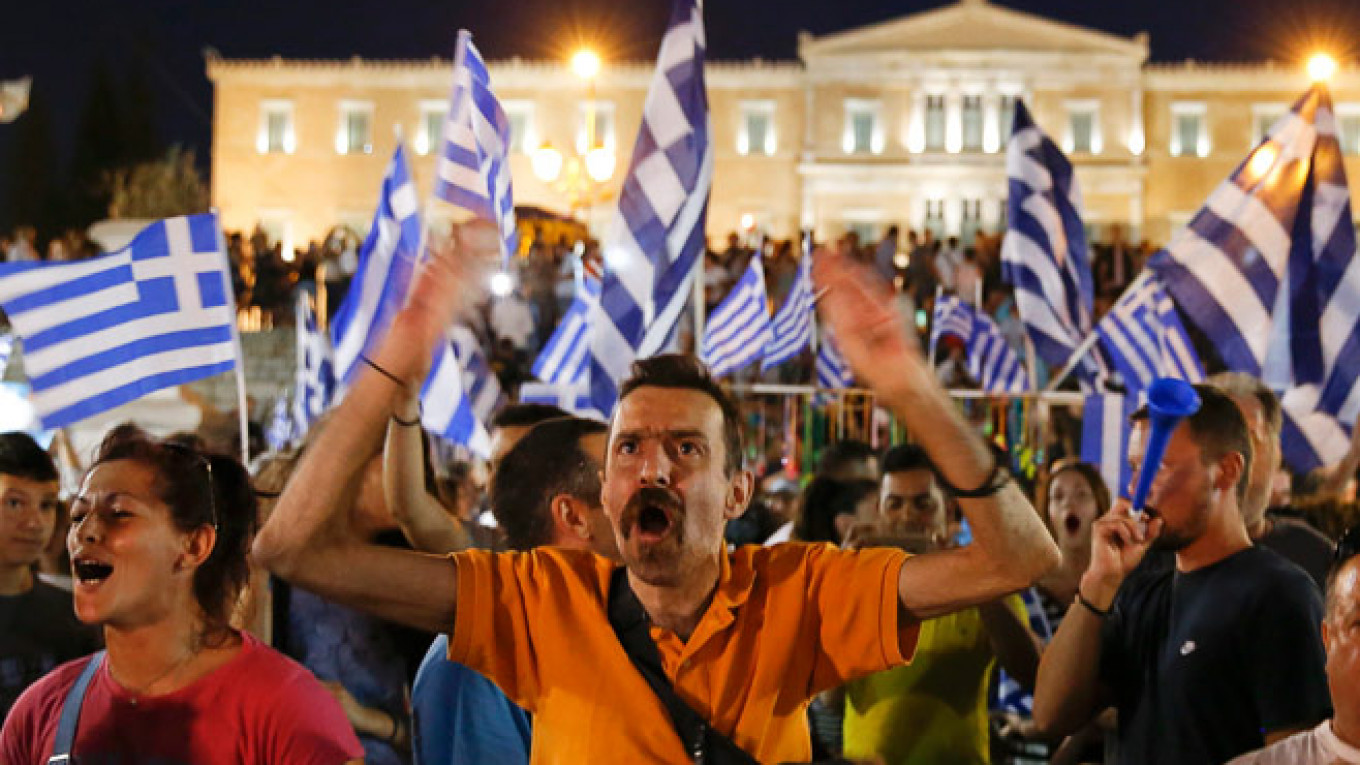As EU leaders gather Tuesday to seek an answer to Greece's sweeping rejection of international bailout terms, Russia —the EU's third-largest trading partner — is quietly waiting to see where the chips fall.
Hailed as a victory for democracy by Greece's new far-left leaders, the resounding "no" vote in Sunday's impromptu referendum hurled the EU into an existential crisis and international markets into turmoil.
Given the massive trade ties between Russia and the EU, the Greek debt crisis and its effect on the euro zone can be expected to leak across the border in some form. The question is how and to what extent.
Some economists — such as Vladislav Inozemtsev, director of the Moscow-based Center for Post-Industrial Studies — say that global markets have already adapted to the Greek crisis, leaving little room for further impact.
But other analysts see both pluses and minuses for Russia in this continued instability in the EU. Here are the four chief ways that the Greek crisis may impact the Russian economy:
1. Spillover From the EU
The first likely problem for Russia lies in the fact that any hit to European Union economies will ultimately affect Russian producers too.
"If there is further uncertainty in the economic development of the euro zone and a fall in its growth rate, it will lead to a drop in European demand for Russian goods," said Sergei Afontsev, head of the department of economic theory at the Moscow State Institute of International Relations.
The European Union is Russia's single largest trading partner, importing more than 180 billion euros ($200 billion) in goods from Russia last year, according to EU statistics agency Eurostat. Russia is the EU's third-largest trade partner after the United States and China.
As negotiations over Greece's debt stalemated in May, the European Commission forecast that economic growth in the EU would still beat 2014's sluggish 0.9 percent growth to rise 1.5 percent this year.
2. Fall in Oil Prices
The Greek crisis could also hit Russia by further depressing the price of oil, a key export commodity.
Uncertainty over the future of the euro zone is expected to weaken the euro currency and send capital fleeing to the more stable U.S. dollar. A stronger dollar, in turn, will pressure commodities prices, which tend to fall when the dollar rises.
Oil prices could fall to $55 per barrel, down from the current level of just below $59, Afontsev said. The price of Brent crude oil fell more than 3 percent on Monday on news of the Greek referendum.
Further falls in the price of oil could pose a serious challenge to the Russian government. The fall from more than $115 in June last year to today's levels has already sapped budget revenues and necessitated wide-ranging budget cuts that hamper the government's ability to battle Russia's current economic recession.
3. Upper Hand in Sanctions Talks
Despite the potential financial losses, the Greek crisis could also strengthen the Kremlin's hand in negotiations with the European Union on its sanctions against Russia, analysts said.
"To make up for the losses caused by the situation in Greece, Europe could return to the Russian market. This is one of the easiest ways to compensate for the losses, as the Russian market is comparable to the Greek market," said Valery Mironov, deputy director of the Higher School of Economics' Center for Development.
The EU last year slapped Russia with a series of economic sanctions over its role in the Ukraine crisis. Among the measures are ones that bar major Russian banks and companies from buying long-term debt on EU capital markets and others that prohibit exports of key military and energy technologies to Russia.
Russia's economic recession — caused in part by EU sanctions — will cost Europe up to 100 billion euros ($113 billion), a study by the Austrian Institute of Economic Research published last month said.
So far, however, a rumored play by Russia to buy a back door into EU decision-making by bailing out Greece seems unlikely.
Despite prior displays of public affection between their governments, President Vladimir Putin in a phone conversation with Greek Prime Minister Alexis Tsipras on Monday merely expressed his "support for the Greek people in surmounting the difficulties that face their country," according to a Kremlin statement.
4. Market Turbulence
Investment in Russia — along with other emerging markets — is under threat from any ripple in the wider world economy, let alone a wave as tall as the Greek crisis.
Russia's dollar-denominated RTS index dropped 1.82 percent on Monday following news of Greece's no vote and falls in the price of oil. The ruble-denominated MICEX stock index fell 0.64 percent.
"The main risk is from volatility in the financial markets and the capital outflow from developing markets. It will affect other developing markets, including Russia," Afontsev said.
Capital flight is already high in Russia, having soared to a record $151.5 billion last year, according to the Central Bank. The regulator last month forecast capital flight of $90 billion in 2015.
Contact the authors at bizreporter@imedia.ru and d.damora@imedia.ru
A Message from The Moscow Times:
Dear readers,
We are facing unprecedented challenges. Russia's Prosecutor General's Office has designated The Moscow Times as an "undesirable" organization, criminalizing our work and putting our staff at risk of prosecution. This follows our earlier unjust labeling as a "foreign agent."
These actions are direct attempts to silence independent journalism in Russia. The authorities claim our work "discredits the decisions of the Russian leadership." We see things differently: we strive to provide accurate, unbiased reporting on Russia.
We, the journalists of The Moscow Times, refuse to be silenced. But to continue our work, we need your help.
Your support, no matter how small, makes a world of difference. If you can, please support us monthly starting from just $2. It's quick to set up, and every contribution makes a significant impact.
By supporting The Moscow Times, you're defending open, independent journalism in the face of repression. Thank you for standing with us.
Remind me later.






